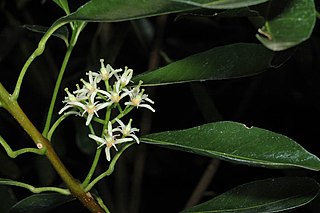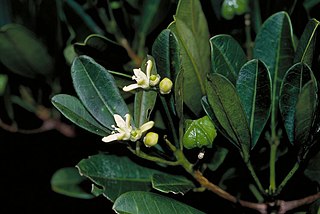
Acronychia acidula, commonly known as lemon aspen or lemon wood, is a species of small to medium-sized rainforest tree that is endemic to Queensland. It has simple, elliptical leaves, small groups of flowers in leaf axils and more or less spherical fruit. The aromatic and acidic fruit is harvested as a bushfood.

Acronychia oblongifolia, commonly known as white aspen or yellow wood, is a species of shrub to medium-sized rainforest tree of the citrus family, Rutaceae and is endemic to eastern Australia. It has mostly simple, egg-shaped leaves with the narrower end towards the base, small groups of creamy-white flowers and fleshy, more or less spherical, edible fruit.

Acronychia littoralis, commonly known as the scented acronychia, is a species of small tree that is endemic to eastern coastal Australia. It has simple, glabrous, elliptic to egg-shaped leaves, small groups of yellow flowers and egg-shaped to more or less spherical creamy-yellow fruit.

Acronychia baeuerlenii, commonly known as Byron Bay acronychia, is a species of rainforest shrub or small tree endemic to eastern Australia. It has simple, glabrous leaves, small groups of flowers and fleshy oval fruit.

Acronychia laevis, commonly known as hard aspen, glossy acronychia or northern white lilly pilly, is a species of shrub or small tree in the citrus family, and is endemic to eastern Australia. It has simple, elliptical to egg-shaped leaves, groups of creamy white flowers and fleshy, mitre-shaped to spherical fruit.

Acronychia octandra, commonly known as doughwood, silver birch or soapwood, is a species of rainforest tree that is endemic to eastern coastal areas of Australia. It has mostly trifoliate leaves with elliptic to egg-shaped leaflets, greenish-white flowers arranged in groups in leaf axils and fleshy fruit of four carpels fused at the base.

Acronychia wilcoxiana, commonly known as silver aspen, doughwood, snowwood or mushyberry, is a species of small rainforest tree that is endemic to eastern Australia. It has simple, elliptical to egg-shaped leaves with the narrower end towards the base, relatively large groups of whitish flowers in leaf axils and broadly oval to more or less spherical, white fruit.

Acronychia pubescens, commonly known as hairy acronychia or hairy aspen, is a species of tall shrub or small tree that is endemic to eastern Australia. It usually has trifoliate leaves, rarely simple leaves, groups of whitish flowers in leaf axils and creamy to yellowish, elliptical to spherical fruit.

Acronychia suberosa, commonly known as corky acronychia, is a species of small to medium-sized rainforest tree that is endemic to eastern Australia. It has mostly trifoliate leaves with elliptic to egg-shaped leaflets with the narrower end towards the base, small groups of cream-coloured flowers and elliptical to spherical, creamy yellow to whitish fruit.
Acronychia aberrans, commonly known as acid berry, lemon aspen, plasticine tree or plasticene aspen, is a species of medium-sized rainforest tree that is endemic to north-eastern Queensland. It has simple leaves on stems that are more or less square in cross-section, flowers in small groups in leaf axils and fleshy, more or less spherical fruit.

Acronychia acronychioides, commonly known as white aspen, is a species of small to medium-sized rainforest tree that is endemic to north-eastern Queensland. It has trifoliate leaves with elliptic to egg-shaped leaves on stems that are more or less cylindrical, creamy yellow flowers in large groups in leaf axils and fleshy, pear-shaped or spherical fruit.

Acronychia acuminata, commonly known as Thornton aspen, is a species of shrub or small rainforest tree that is endemic to north-eastern Queensland. It has simple leaves on stems that are more or cylindrical, flowers in small groups in leaf axils and fleshy, oval to spherical fruit.

Acronychia chooreechillum, commonly known as mountain aspen, is a species of shrub or small rainforest tree that is endemic to north-eastern Queensland. It has mostly trifoliate leaves with elliptic to egg-shaped leaflets on stems that are more or less cylindrical, flowers in small groups in leaf axils and fleshy, egg-shaped or elliptical fruit.
Acronychia eungellensis, commonly known as Eungella aspen, is a species of small rainforest tree that is endemic to a restricted area in east-central Queensland. It has simple, elliptic leaves on cylindrical stems, flowers in small groups in leaf axils, and fleshy fruit that is elliptic to egg-shaped in outline.

Acronychia imperforata, commonly known as Logan apple, Fraser Island apple, or green tree, is a species of rainforest shrub or small tree that is endemic to north-eastern Australia. It has simple, elliptical to egg-shaped leaves, small groups of yellowish or creamy white flowers and fleshy spherical to oval fruit.

Acronychia parviflora is a species of shrub or small rainforest tree that is endemic to north-eastern Queensland. It has simple, egg-shaped to elliptical leaves, flowers arranged singly or in small groups in leaf axils and fleshy, more or less spherical fruit.

Acronychia pauciflora, commonly known as few-flowered acronychia or soft acronychia, is a species of shrub or small tree that is endemic to eastern Australia. It has simple, egg-shaped leaves with the narrower end towards the base, greenish white flowers arranged in small groups, mostly in leaf axils and fleshy, more or less spherical fruit.

Acronychia vestita, commonly known as white aspen, lemon aspen, hairy aspen or fuzzy lemon aspen, is a species of rainforest tree that is endemic to Queensland. It has simple, elliptic to egg-shaped leaves with the narrower end towards the base, flowers arranged in relatively large groups, mostly in leaf axils and fleshy, pear-shaped to more or less spherical fruit.
Elaeocarpus carolinae is a species of flowering plant in the family Elaeocarpaceae and is endemic to north-east Queensland. It is a tree with buttress roots at the base of the trunk, elliptic to oblong leaves with wavy-toothed edges, flowers with five white petals with lobed tips and spherical blue to purple fruit.
Elaeocarpus ferruginiflorus is a species of flowering plant in the family Elaeocarpaceae and is endemic to north-east Queensland. It is a small to medium-sized tree, sometimes with buttress roots at the base of the trunk, elliptic to egg-shaped leaves, flowers with five white petals, and dark bluish-grey fruit.

















